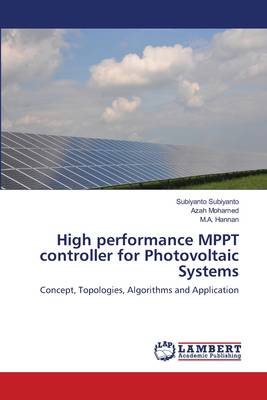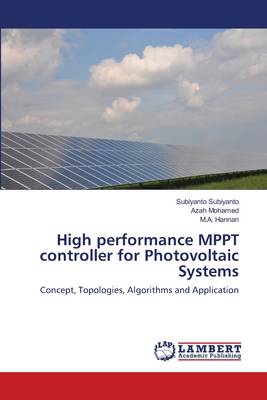
- Afhalen na 1 uur in een winkel met voorraad
- Gratis thuislevering in België vanaf € 30
- Ruim aanbod met 7 miljoen producten
- Afhalen na 1 uur in een winkel met voorraad
- Gratis thuislevering in België vanaf € 30
- Ruim aanbod met 7 miljoen producten
Zoeken
High performance MPPT controller for Photovoltaic Systems
Concept, Topologies, Algorithms and Application
Subiyanto Subiyanto, Azah Mohamed, M. A. Hannan
Paperback | Engels
€ 67,45
+ 134 punten
Omschrijving
Due to the growing demand for electrical energy and environmental impact such as global warming and pollution, photovoltaic (PV) energy generation system has been considered as a technological option for generating clean energy. The advantage of PV system is that it is pollution free, but it still has relatively low conversion efficiency from solar irradiation to electric power. Power delivered by the PV system depends on several environmental factors such as lighting conditions, temperature and shading. The nonlinear characteristic of PV array, the fluctuating output power which varies with temperature and irradiation and losses in power conditioner devices are among the drawbacks of PV systems. An important consideration in increasing the efficiency of PV systems is to operate the system approximate to the maximum power point (MPP). This book discussed a new high performance maximum power point tracking (MPPT) controller by using a new boost converter and a new intelligent MPPT algorithm.
Specificaties
Betrokkenen
- Auteur(s):
- Uitgeverij:
Inhoud
- Aantal bladzijden:
- 196
- Taal:
- Engels
Eigenschappen
- Productcode (EAN):
- 9783659155369
- Verschijningsdatum:
- 12/06/2012
- Uitvoering:
- Paperback
- Afmetingen:
- 152 mm x 229 mm
- Gewicht:
- 295 g

Alleen bij Standaard Boekhandel
+ 134 punten op je klantenkaart van Standaard Boekhandel
Beoordelingen
We publiceren alleen reviews die voldoen aan de voorwaarden voor reviews. Bekijk onze voorwaarden voor reviews.











